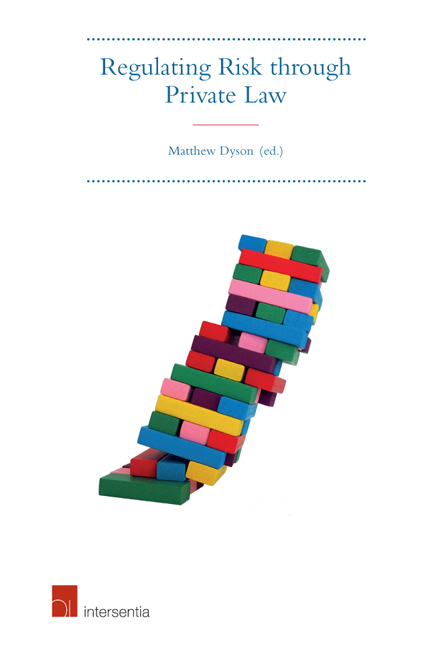Book contents
- Frontmatter
- Preface
- Contents
- Table of Cases
- List of Contributors
- Chapter 1 Introduction
- Part I Risk Overviews
- Chapter 2 Risk and english tort law
- Chapter 3 Risk and French Private Law
- Chapter 4 Risk in Swedish Tort Law: Of Models and Muddles
- Chapter 5 Risk and Italian Private Law
- Chapter 6 Regulating Risk Through Private Law: The Spanish Approach
- Chapter 7 How Dutch Tort Law Responds to Risks
- Chapter 8 Risk and Chilean Private Law
- Chapter 9 Regulating Risk Through Private Law: South Africa
- Chapter 10 Risk and Brazilian Private Law
- Part II State of the national art on risk
- Index
- About the Editor
Chapter 9 - Regulating Risk Through Private Law: South Africa
from Part I - Risk Overviews
Published online by Cambridge University Press: 13 October 2018
- Frontmatter
- Preface
- Contents
- Table of Cases
- List of Contributors
- Chapter 1 Introduction
- Part I Risk Overviews
- Chapter 2 Risk and english tort law
- Chapter 3 Risk and French Private Law
- Chapter 4 Risk in Swedish Tort Law: Of Models and Muddles
- Chapter 5 Risk and Italian Private Law
- Chapter 6 Regulating Risk Through Private Law: The Spanish Approach
- Chapter 7 How Dutch Tort Law Responds to Risks
- Chapter 8 Risk and Chilean Private Law
- Chapter 9 Regulating Risk Through Private Law: South Africa
- Chapter 10 Risk and Brazilian Private Law
- Part II State of the national art on risk
- Index
- About the Editor
Summary
INTRODUCTION
There are two distinct ways in which risk-reasoning features in the South African law of delict. The first, which is the subject of section 9.2 below, relies on the concept of ‘risk-taking’. The second, which is discussed in section 9.3, relies on the notion of ‘risk generation’.
Risk-taking is the ground upon which the South African law of delict imposes Aquilian liability on negligent harm-doers. A harm-doer was negligent if he created the risk of the harm that eventuated and was at fault in doing so: because a reasonable person in his position would have foreseen the risk and, having foreseen it, would have guarded against it. The law disapproves of the risk-taking conduct, and that is the reason for the imposition of liability in respect of the harm suffered. However, risk-taking may also serve as a reason to deny liability. Thus the defence of volenti non fit iniuria deprives the plaintiff in a delictual action of an otherwise valid claim on the ground that he has assumed responsibility for the negative outcome of a risk generated by the defendant. This is similar to the way in which a claim in unjustified enrichment – in so far as it arises in whole or in part from mistake on the part of the plaintiff – is refused if he can be said to have taken the risk of his mistake. The effect of risk-taking on the part of the plaintiff is to neutralise mistake as a cause of action, since his mistake can no longer be said to have caused him to confer the benefit in question.
When we consider the efforts of the South African law of delict to regulate risk, it seems that we are concerned not only with risky conduct of which the law disapproves, but also with risky activities which the law wishes to encourage, or at least has no reason to discourage. Even socially beneficial activities generate risks of harm, and the question then arises whether the law of delict should regulate these risks through the imposition of liability on the risk-generator, as opposed to letting the loss lie where it falls, or – outside the immediate domain of private law – creating some form of insurance scheme by means of which the loss is spread throughout the general population or some part thereof.
- Type
- Chapter
- Information
- Regulating Risk through Private Law , pp. 223 - 252Publisher: IntersentiaPrint publication year: 2018



